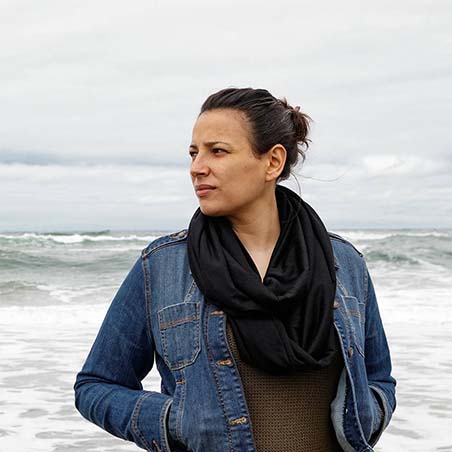Sheima Benembarek
Freelance Journalist and Writer
Master of Fine Arts in Creative Nonfiction, 2020
I thought I was a fiction writer at first. I was in fiction workshops, a little bit of poetry, and it turned out that I’m more interested in nonfiction: intersectional feminism, immigrant narratives, social justice stories, when served through the lens of true accounts, have so much impact.
What does it mean to be a woman with a sexuality? What does it mean, in particular, to be a Muslim woman with sexual desires in this continent? Sheima Benembarek, MFA’20, explores these delicate questions in her book Halal Sex: The Intimate Lives of North American Muslim Women, published by Penguin Canada on March 21, 2023.
“I was told about the options I have and don’t have, and what can ruin you and what you can’t do. Then I came to university in Canada and I realized that my upbringing and viewpoint were too restricted, that there are so many different ways of being a human being, especially sexually. And so I thought I’d love to write some day about this.”
Sheima was born in Saudi Arabia, raised in Morocco and has been in Canada for nearly 17 years, having originally immigrated to Montreal to study literature and creative writing at Concordia. She then received a graduate certificate in book, magazine, and electronic publishing at Centennial College prior to attending King’s for the Master of Fine Arts in Creative Nonfiction.
“When I was at Concordia, I thought I was a fiction writer. I was in fiction workshops, a little bit of poetry, and it turned out that I’m more interested in nonfiction: intersectional feminism, immigrant narratives, social justice stories, when served through the lens of true accounts, have so much impact.”
For Halal Sex, Sheima put out a call online to speak with Muslim women living in North America and was overwhelmed with the response: “I think the tough thing was figuring out who to include because all the stories are valid,” she says. The book features a wide range of demographics, including immigrants and those who were born and raised in North America, various ages, different sexual orientations, socioeconomic backgrounds, and professions, including a woman who works in the public sector, a university student, and a sex worker.
“I wanted to give as much potential for people to connect with the book and make sure that it was inclusive. The point, for me, is that hopefully someday a young Muslim woman picks up the book and is distressed over whatever limitations she’s experiencing in her life and she reads it and sees there’s all these other options, and that she can fight back and be who she is authentically.”
When she set out to write the book, Sheima expected to eventually understand the best way to be a sexual woman, which in her mind was “to have as many experiences and partners as possible. That’s kind of what I thought was the most optimal way of being and that’s why there was so much struggle in communities that are so constrained. But I quickly learned that I was doing the opposite of what I was fighting for, I was also being very prescriptive in saying this is how you should be, at least in my own mind.”
Sheima credits the MFA program and her mentors, Ayelet Tsabari and Charlotte Gill, with helping her find the structure and voice of the book.
“It was the perfect fit in terms of the craft, but it also didn’t require me to quit my day job and be a full-time student so it was something I did during my off-hours and then we would meet for residencies in the summers and winters. It just makes sense in an adult person’s life.” She is employed as an events manager for The Walrus and produces The Walrus Talks event series, as well as a freelance journalist with publications such as Maisonneuve, Literary Review of Canada, Torontoist, Broadview and others. She initially envisioned her current project as a long-form magazine piece, but David Hayes, a long-time industry friend and another mentor in the King’s MFA program, said “you’re thinking too small, this could be a book—you need to expand it.” And so, she did.
For the last six months, with the support of grants from the Canada Council for the Arts and Ontario Arts Council, she has been working exclusively on Halal Sex from a cottage deep in the Laurentian woods in Quebec where she virtually interviews, transcribes and writes the stories shared with her.
What’s been made clear is that there may not be one single answer to the question she set out to uncover: “The truth is, women and sexuality is super complex, varied and layered, and there is no one way. The underlying message of my book is just figure out what works for you and do that, no matter what anyone else thinks.”
